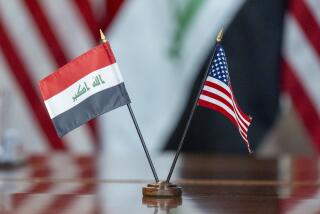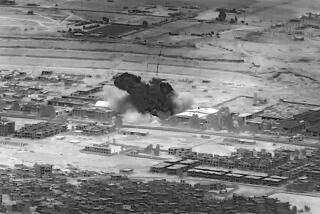Tightest Security Has Holes
- Share via
BAGHDAD — To protect U.S. troops where they eat and sleep, commanders have put up a cordon of concrete barriers, concertina wire and staggered guard posts at U.S. military bases throughout Iraq.
Yet Tuesday’s brazen attack at Forward Operating Base Marez near Mosul proved that these measures were insufficient to prevent Iraqi insurgents from striking U.S. troops at a place and time of their choosing.
U.S. military officials will be taking a hard look not only at base security but also at the vetting procedures that allow thousands of Iraqis -- soldiers and civilians -- onto U.S. facilities.
In the rush to get Iraqi troops in place, Army counterintelligence officers are struggling to investigate the histories, backgrounds and political views of the 120,000 men who now constitute Iraq’s security forces, officials say.
U.S. and Iraqi officials have warned that Iraq’s police and army probably were being infiltrated by insurgents, who can strike anywhere.
“We have no front lines. The front line can be the dining hall; it can be the road outside the base; it can be the police station or the governor’s office or the mayor’s office down at Mosul,” Air Force Gen. Richard B. Myers, chairman of the Joint Chiefs of Staff, said Wednesday during a Pentagon briefing with Defense Secretary Donald H. Rumsfeld. “That’s their territory.”
Iraqi officials lament the difficulty of investigating workers who enter U.S. bases.
“We have many problems with getting information about their backgrounds,” said Sabah Kadhim, spokesman for Iraq’s Interior Ministry. “There’s a lack of information.”
In a country still struggling to restore electricity, computerized databases to help screen potential soldiers and civilian workers for criminal records and financial problems are almost nonexistent.
Some technology brought by U.S. troops have helped. The Marines are using retina scanners and fingerprinting machines to compile a database of Iraqis permitted onto Marine bases throughout central Iraq.
The Marines also do not allow any trucks other than their own to enter their bases, forcing haulers to unload outside the perimeter. The Marines then put the cargo on their own vehicles and carry it onto the base.
Officers say they try to vary the daily rhythm of base life to make soldiers less vulnerable to attack.
“It’s not enough to implement a base security plan and follow a regular routine. The Iraqi insurgents pick up on our routines,” said Marine Lt. Col. David Pere, who recently was the coordinator of base security at Camp Fallouja.
Iraqis hold a wide variety of jobs on U.S. bases, including interpreters, maintenance and construction workers and kitchen help. Some bases house barbershops and gift shops run by Iraqis. And some also run errands for the Americans outside the bases.
They line up daily to enter their workplaces, sometimes in queues the length of a football field.
At Forward Operating Base Marez, where 22 people died in Tuesday’s attack, all civilians -- including those employed on the base -- must pass through at least four checkpoints and searches, the first two controlled by Iraqi security forces and the last two by U.S. soldiers, Iraqi workers said.
“To tell you the truth, it is an exasperating process,” said one Iraqi employee, who, like others interviewed, did not want to be identified. “I have worked there as an interpreter for the past year, and they have never been easy on me.”
The attack is likely to make entry procedures even more restrictive, and commanders are scrambling to determine ways to increase base security.
After investigators in Mosul determined that the attack probably was the work of a suicide bomber, military officers in Tikrit, where the Army’s 1st Infantry Division is based, banned all backpacks from the division’s mess halls.
“Whenever we have an incident like this, we want to review our own procedures,” said Lt. Col. William Russell, the 1st Infantry Division’s force protection officer.
The Mosul attack has heightened tensions between Americans and Iraqis on some bases.
Dining on pizza Wednesday in a nearly empty mess hall on the base in Tikrit, Army Spc. Ernesto Chapa and Spc. Daniel Dominowski said they were concerned about the local workers allowed on base.
“Not all Iraqis are bad guys, but some of them are,” said Chapa, adding that he would prefer to have no locals working on the base. “Having cheap labor isn’t worth endangering people’s lives, especially when we can do the jobs ourselves.”
Dominowski said, “Even though they’re escorted, it’s definitely something I worry about. I don’t think they can do background checks on everybody.”
Mazzetti reported from Washington and Sanders from Baghdad. Times staff writer Louise Roug in Tikrit and special correspondent Roaa Ahmed in Mosul contributed to this report.
More to Read
Sign up for Essential California
The most important California stories and recommendations in your inbox every morning.
You may occasionally receive promotional content from the Los Angeles Times.










